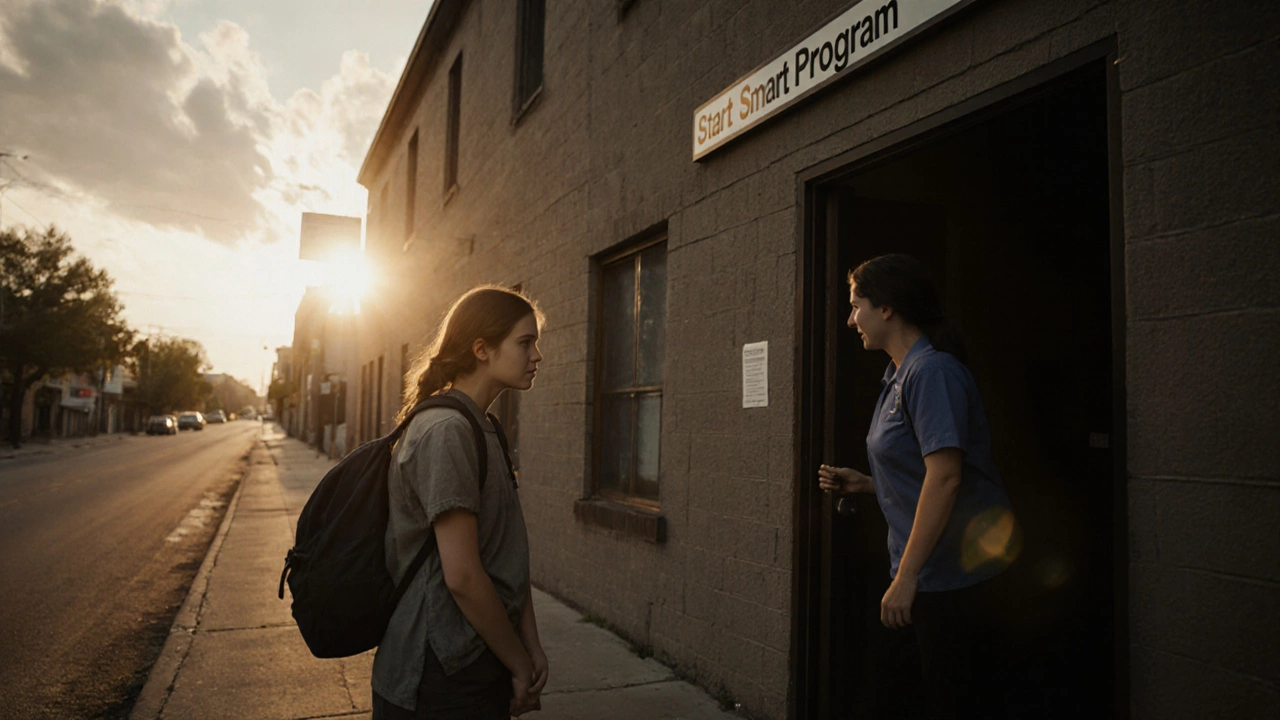Start Smart Program Eligibility Checker
Every year in Arkansas, hundreds of young people wake up with no place to call home. Some are kicked out. Others run away from abuse. A few just age out of foster care with no safety net. For these teens and young adults, survival comes first-finding food, a place to sleep, staying safe. That’s where the Start Smart Program steps in.
What Exactly Is the Start Smart Program?
The Start Smart Program is a state-funded initiative in Arkansas designed to help homeless youth aged 16 to 21 get off the streets and onto stable ground. It’s not just a shelter. It’s a full support system that gives young people the tools they need to live independently. Run by the Arkansas Department of Human Services in partnership with local nonprofits, the program combines housing, job training, education support, and mental health services under one roof.
Unlike traditional shelters that offer a bed and little else, Start Smart treats young people as capable individuals who need structure, not pity. Participants live in supervised group homes or transitional apartments. They’re required to attend school or work, attend weekly life skills classes, and meet with case managers. The goal? To break the cycle of homelessness before it becomes lifelong.
How Does the Program Work?
The process starts with a referral-either from a school counselor, social worker, or sometimes the youth themselves walking in. Once accepted, they’re assigned a case manager who creates a personalized plan. Here’s how it breaks down:
- Safe Housing - Participants live in one of six designated Start Smart homes across the state, including locations in Little Rock, Fayetteville, and Fort Smith. These aren’t dorms or shelters-they’re apartments with rules, routines, and adult supervision.
- Education Support - If you’re not in school, you’re enrolled in GED prep or adult education. If you’re already in school, tutors and transportation help you stay on track. The program pays for school supplies, fees, and even uniforms.
- Job Training - Participants learn basic job skills like resume writing, interviewing, and punctuality. Many get placed in paid internships with local businesses. Common partners include Walmart, local hospitals, and food service companies.
- Life Skills - Weekly classes cover budgeting, cooking, laundry, managing mental health, and avoiding exploitative relationships. One participant told a reporter, "I didn’t know how to write a check until I got here. Now I pay my own bills."
- Mental Health & Counseling - Trauma-informed therapists are on-site. Many youth enter the program with anxiety, depression, or PTSD. Therapy is free and confidential.
The program lasts up to 24 months. Most participants graduate with a high school diploma or GED, a job, a bank account, and a plan. Around 78% of those who complete the program stay housed one year after leaving-a rate far higher than the national average for homeless youth.
Who Qualifies?
You don’t need to be in crisis to apply. You just need to be between 16 and 21, homeless or at risk of homelessness, and willing to follow the program rules. That means:
- No drugs or alcohol on premises
- Attendance at school or work is mandatory
- Curfew is enforced (usually 10 p.m. on weekdays, midnight on weekends)
- Participation in all required meetings and classes
Parents or guardians don’t need to consent. If a teen is fleeing abuse or unsafe conditions, they can apply on their own. The program protects their identity and doesn’t notify family unless the youth chooses to reconnect.

Real Stories, Real Impact
At 17, Maria left her home after her stepfather threatened her. She slept in a friend’s car for three weeks before finding Start Smart. Within six months, she got her GED, started working part-time at a grocery store, and saved enough for a security deposit on her own apartment. Today, she’s studying nursing at a community college and mentors new participants.
Jamal, 19, was in foster care until he turned 18. No one showed up at his door with keys to an apartment. He ended up on the streets of North Little Rock. Start Smart gave him a bed, a counselor, and a job at a local auto shop. He’s now a certified mechanic and works full-time. "They didn’t just give me a place to sleep," he says. "They gave me a future."
How Is It Funded?
The Start Smart Program gets its funding from a mix of state appropriations, federal grants under the Runaway and Homeless Youth Act, and private donations. In 2025, Arkansas allocated $4.2 million to the program-up from $2.8 million in 2022. That increase came after a state audit found that every dollar spent on Start Smart saved $3.70 in future emergency services, jail costs, and public assistance.
It’s one of the few youth homelessness programs in the South that doesn’t rely on charity alone. It’s treated like public infrastructure-like roads or schools.

How to Get Help
If you or someone you know needs help, here’s how to reach the program:
- Call the Arkansas Youth Helpline at 1-800-START-SMART (1-800-782-7876). It’s staffed 24/7.
- Visit any local Department of Human Services office. Ask for the Start Smart intake team.
- Go to www.arkansas.gov/dhs and click on "Youth Services."
You don’t need an ID, proof of residency, or a referral. Walk-ins are welcome. Staff are trained to meet youth where they are-without judgment.
What Happens After You Leave?
Graduation from Start Smart doesn’t mean being cut off. Alumni get access to:
- Continued case management for up to 12 months after leaving
- Emergency housing if they lose their job or apartment
- Free access to career counseling and job placement services
- Monthly alumni meetups with peer support
Many graduates stay connected. Some even come back as mentors or volunteers. The program doesn’t end when you move out-it evolves.
Why This Program Matters
Homeless youth don’t disappear. They end up in emergency rooms, jails, or worse. Start Smart interrupts that path. It doesn’t just house kids-it rebuilds them. And it works.
Arkansas isn’t perfect. But when it comes to helping young people who’ve been let down by the system, Start Smart is one of the clearest examples of policy done right. It’s not flashy. It doesn’t make headlines. But every day, it gives someone a chance to stop surviving-and start living.
Is the Start Smart Program only for teens in foster care?
No. While some participants come from foster care, the program is open to any youth aged 16 to 21 who is homeless or at risk of becoming homeless. This includes those who’ve been kicked out, ran away, or have no safe place to live-even if they’ve never been in the foster system.
Can I join Start Smart if I have a criminal record?
Minor offenses, like petty theft or trespassing related to survival, won’t disqualify you. The program focuses on rehabilitation, not punishment. Serious violent crimes may be reviewed on a case-by-case basis, but the goal is always to help, not exclude.
Do I have to be a U.S. citizen to join?
No. Citizenship is not required. The program serves all youth regardless of immigration status. Your background won’t be reported to immigration authorities.
What if I’m not ready to work or go to school?
That’s okay. The first few weeks are about building trust. Staff won’t force you into a job or class right away. But they will work with you to find what motivates you-whether it’s getting a driver’s license, reuniting with a sibling, or learning to cook. Progress is measured in small steps.
Can I bring my pet or partner to the program?
Pets are not allowed in the housing units due to safety and space restrictions. Partners or romantic relationships are discouraged during the program to help youth focus on personal growth and avoid unhealthy dynamics. However, if you have a child, the program can connect you with family housing options nearby.
